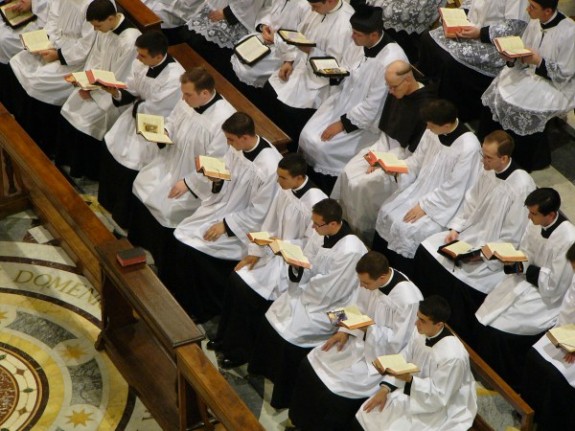From Arkansas comes this profile of an organization doing the invaluable work of helping young people saddled with debt answer the call to a vocation:
Minnesota businessman Cy Laurent remembers the moment the Holy Spirit lit a path for what would become his lay ministry, the Laboure Society. Talking to a young woman about a job, she told him she had discerned a vocation but had been stymied by her debts.
Laurent, a Catholic, rallied some of his business associates to help pay down the woman’s outstanding debt, allowing her to pursue her vocation.
“It’s been 12 years since she professed her final vows, thanks be to God,” Laurent said. “That experience was quite wonderful, and I started to look around to see if there were others in that situation.”
What Laurent discovered — and what few casual observers realize — is the roadblock debt presents to thousands of potential priestly and religious vocations.
While guidelines vary by order, diocese and seminary as to what debt new members are allowed to carry, for many religious orders that number is zero. Such is the case in Arkansas with the Carmelite friars, Benedictine and Olivetan Benedictine sisters, among others.
In other situations, individuals are allowed to have existing student loans but no personal debt such as from credit cards or a mortgage. Many divinity schools observe this guideline, as do the Benedictine monks of Subiaco Abbey who allow new members to enter having educational debt up to $50,000, with the permission of the abbot.
The Diocese of Little Rock also allows seminarians on a case-by-case basis to have educational debt but no personal debts, said Msgr. Scott Friend, vocations director.
“We are going to work with someone and help them,” he said of school loans.
Even with these exceptions, it is estimated that as many as 10,000 individuals discerning a vocation are turned away because of their finances.
In a 2012 study the Center for Applied Research in the Apostolate at Georgetown University found 70 percent of institutes turned at least one person away — a person who in all other aspects has been accepted into the community — because of money issues.
Aiden Toombs knows this quandary firsthand. A native of Washington state, he attended graduate school at the University of Arkansas for Medical Sciences in Little Rock in the 1990s. At the time, his faith had fallen into disrepair.
“By the time I got to Little Rock, I was a devout atheist,” Toombs told the Arkansas Catholic, Little Rock’s diocesan newspaper. “But it was at UAMS that I had my conversion experience. I was reading the Bible in my room and I was reading the Gospel of Matthew and it was very clear that Jesus was talking to me directly.”
It wasn’t long before the rekindled Christian spark led him to Catholicism and he attended the Cathedral of St. Andrew. Moving back to Seattle, he joined the Catholic Church in 1999 and shortly thereafter, his thoughts turned to a religious life and he began to research different vocational options.
The same problem always arose. Having attained both a law degree and completed graduate work in biology, Toombs’ student loans totaled more than $100,000. While that figure is more than the $45,000 the average vocational aspirant carries, it’s not beyond what Laurent had seen in the 10 years since he launched the not-for-profit Laboure Society.
“We are a national organization with the specific purpose of serving the church by delivering vocations which would otherwise be lost,” he said.












